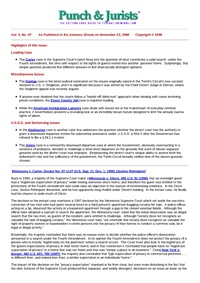Case held that an obstruction of justice enhancement may be applied to punish a defendant who feigns incompetence in an effort to delay or avoid trial and punishment.
While the Court acknowledged that the commentary to § 3C1.1 does not explicitly refer to the act of feigning incompetence …
Back in 1990, a majority of the Supreme Court ruled, in Minnesota v. Olson, 495 U.S. 91 (1990), that an overnight guest had a "legitimate expectation of privacy" while visiting someone else's home, and therefore the guest was entitled to the protections of the Fourth Amendment and could raise …
QUOTE OF THE WEEK - On the Government's right to "stack the deck" against aliens.
"When a permanent resident alien's substantial interest in remaining in this country is at stake, the Due Process Clause forbids the Government to stack the deck in this fashion. Only a compelling need for …
Case held that due to language in 28 CFR § 551.163 that warden "shall identify" smoking areas, a ban on smoking in all areas of a prison camp was improper and not a proper interpretation of the BOP's own regulation.
In this case the Court held that a …
In the case entitled In Re Sealed Case, 149 F.3d 1998 (D.C.Cir. 1998), the D.C. Circuit ruled that a government motion is not an absolute prerequisite to a downward sentencing departure for "substantial assistance" to authorities under U.S.S.G. § 5K1.1. The D.C. Circuit reasoned that although U.S.S.G. § 5K1.1 …
Here the Court affirmed a three level downward departure that was granted on the basis of a combination of nine of the eleven different factors cited by the district court.
The defendant in this case pled guilty to possession of a firearm by a prohibited person, in violation …
Largely adopting the reasoning of Judge DuBois in Imprisoned Citizens Union v. Schapp, 11 F.Supp.2d 586 (E.D.Pa. 1998) - and rejecting the analysis of Judge Devevoise in Denike v. Fauver, 3 F.Supp.2d 540 (D.N.J. 1998) - Chief Judge Cahn held that the termination provisions of the PLRA do not …
As the clock ticks down on the Tenth Circuit's soon-to-be released en banc review of U.S. v. Singleton, 144 F.3d 1343 (10th Cir. 1998), we note this decision especially because it was written by Judge Matsch, who recently presided over the trial of Timothy McVeigh, the convicted Oklahoma City …
This case consolidates a series of lawsuits brought by various plaintiffs, including ten immigrant assistance organizations, challenging the constitutionality of the Illegal Immigration Reform and Immigrant Responsibility Act of 1996 ("IIRIRA"), as well as to the regulations, policies, and practices implemented thereunder. It is noted because of its blunt, …
Court held that the Government had failed to show by clear and convincing evidence that defendant's release would create substantial risk of bodily injury to others or serious damage to property of others to justify continued commitment.
At issue in this case was the language from § 851(a)(2) which states in part: "An information may not be filed under this section if the increased punishment which may be imposed is imprisonment for a term in excess of three years unless the person either waived or was …
Case held that the district court properly looked to the charging documents to determine whether a state common law assault classified as a misdemeanor was a "violent felony" for purposes of the Armed Career Criminal Act.
In this case the defendant was sentenced as an Armed Career Criminal …
This case consolidates a series of lawsuits brought by various plaintiffs, including ten immigrant assistance organizations, challenging the constitutionality of the Illegal Immigration Reform and Immigrant Responsibility Act of 1996 ("IIRIRA"), as well as to the regulations, policies, and practices implemented thereunder. It is noted because of its blunt, …
This decision reflects a poignant comparison between the microcosm of prison life and the enlightened concept of realpolitik. The plaintiff-inmates in this case filed a motion to hold county correction officials in civil contempt for non-compliance with certain provisions of a consent decree that was entered into to correct …
Here the Court affirmed its prior rulings that a departure analysis based on aberrant conduct focuses "not on the number of discrete acts undertaken by the defendant, but on 'the aberational character of her conduct' " (Id., at 500).
